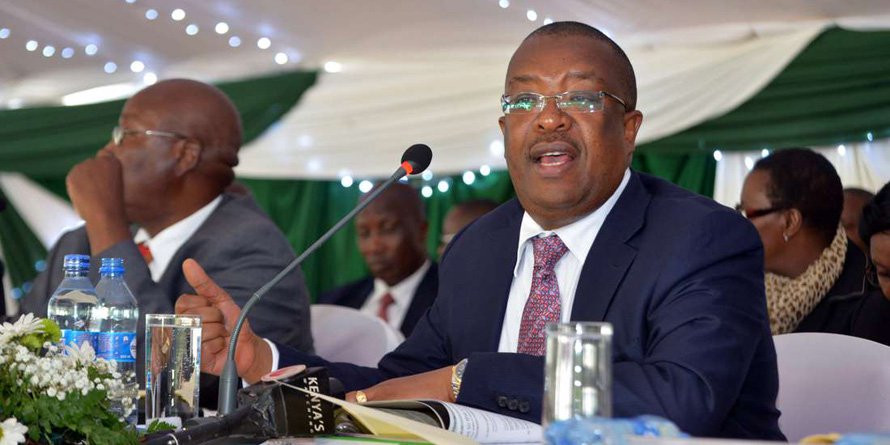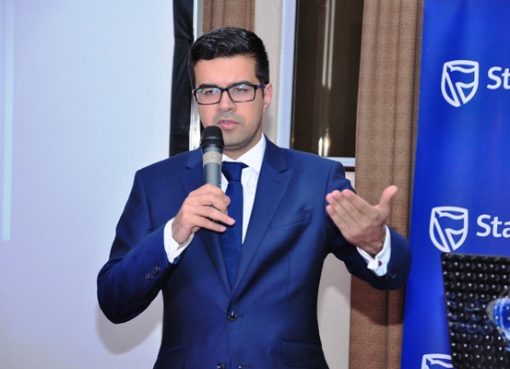Gideon Muriuki, the Chief Executive of Kenya based Cooperative (Co-op) Bank, has emerged as the best paid executive among his peers leading public listed companies, reports the Business Daily.
He is potentially the highest paid CEO especially of listed companies in East Africa.
Co-op Bank says in its annual report that it paid Mr Muriuki a total of KSh370 million (UShs13.6bn) in the year ended December 2017 — KSh99.8 million (UShs3.68bn) in salary and allowances before crowning it all with a KSh270.7 million (UShs10bn) bonus.
The pay is equivalent to more than KSh1 million (UShs36.9m) per day.
The report shows that Mr Muriuki earned KSh92.6 million (UShs3.4bn) in salary and allowances the previous year, meaning he got a KSh7 million (UShs258.6m) pay increase in 2017.
It is not clear from the report whether he earned any bonus for that period.
At KSh370 million (UShs13.6bn), Mr Muriuki so far stands as the highest paid leader of a Nairobi Securities Exchange-listed firm, beating by more than KSh100 million (UShs3.69bn) Joshua Oigara, the chief executive of Kenya’s largest bank KCB, whose pay stood at Sh256 million (UShs9.4bn).
Mr Muriuki’s 2017 pay was also more than five times the Sh60.4 million (UShs2.2bn) that Equity Bank’s James Mwangi earned.
KCB is Kenya’s biggest bank with KSh646.7 billion (UShs23.8 trillion) asset base while Equity is second with KSh524.5 billion (UShs19.37 trillion) total assets. Co-op has an asset base of KSh386.9 billion (UShs14.29 trillion).
Long service
Co-op Bank says the remuneration reflects natural accruals from Mr Muriuki’s long service and his role in turning around the bank from a loss-making operation to one of the country’s biggest lenders.
“Under the performance driven culture, it is noteworthy that the bank has progressively improved profitability from a huge loss of KSh2.3 billion (UShs84.9bn) in 2000 and an asset base of Sh22.3 billion (UShs823.9bn) to the current profit before tax of over Sh16.4 billion (UShs606bn) and an asset base of almost Sh400 billion (UShs14.7 trillion),” Co-op Bank says in its remuneration report.
Mr Muriuki, who was hired in March 2001, reported the lender’s first net profit of KSh164.7 million (UShs6bn) in 2002. The earnings rose in subsequent years to reach Sh11.4 billion (UShs421.2bn) in the year ended December 2017, representing a compounded annual growth rate of 30.32 per cent.
The bank’s shareholder funds, which stood at KSh1.9 billion (UShs70.2bn) in 2001, has grown to KSh68 billion (UShs2.5 trillion) and attracted a 50 per cent premium in the market, raising it to KSh103 billion (UShs3.8 trillion).
Co-op Bank’s rise coincided with those of Equity and KCB. The three local lenders have since grown to overtake former top dogs Barclays Bank of Kenya and Standard Chartered Bank by nearly all measures, including assets, profitability and customer base.
Most efficient lender
Equity has cemented its position as the country’s most efficient bank with an annualised return on equity (RoE) of 28.5 per cent having reported a 21.4 per cent growth in net profit to KSh5.8 billion (UShs214.3bn) in the first quarter ended March 2018.
KCB and Co-op are at par with an RoE of 20 per cent, arising from 14.1 and 6.8 per cent earnings growth to KSh5.1 billion (UShs188.4bn) and KSh3.4 billion (UShs125.6bn) respectively in the same quarter.
Financial Times has consistently ranked the three Kenyan banks in the same peer group, despite their posting mixed results on various fronts.
KCB is in the pole position, judging by the five-year 10.06 per cent net income growth rate. Equity is second with a 9.33 per cent net income growth and Co-op third with 8.11 per cent. Co-op holds a wide lead on the dividend growth rate having clocked 17.5 per cent in the past five years, followed by Equity (9.86 per cent) and KCB (9.57 per cent).
While the three banks have a presence in nearly all the market segments, including retail, investment and corporate banking, Co-op has followed different strategies in its pursuit of growth.
The bank has entrenched its ties with savings and credit cooperative societies (saccos), providing it with a loyal customer base that supplies large and reliable deposits.
Regional operations
The lender took the same model to South Sudan where it formed a joint venture with the government, whose 49 per cent stake is held in trust for the country’s sacco movement.
Co-op also trails KCB and Equity by far when it comes to regional operational footprint. Unlike KCB and Equity who have a presence in Uganda, South Sudan, Tanzania and Rwanda, Co-op is only in South Sudan.
Equity, which upended the local banking industry with zero-balance accounts, has relied on its retail banking success to expand its lending to large institutions.
KCB has relied on sheer scale of its operation and deposits from government agencies to take more territory in the regional market.
Who is Dr. Gideon Muriuki?
Muriuki was appointed Group Managing Director & CEO of Co-op bank in 2001. He joined the same bank in 1996 as a Senior Corporate Manager then Director, Corporate and Institutional Banking in 1999. He holds a Bachelor of Science degree in Mathematics. He is also a Fellow of the Kenya Institute of Bankers and was awarded an Honorary Doctorate in Business Management.
He has over 28 years’ experience in banking and finance.
He is a Director of Kingdom Securities Limited, Vice-President Africa – International Co-operative Banking Alliance (ICBA), former Chairman, Governing Council of the Africa International University and former Chairman, African Rural and Agricultural Credit Association (AFRACA).
He was voted the CEO of the Year Africa 2014 by the International Banker, 2016 Lion of Judah Award by Evangelical Alliance of Kenya and Mtumishi Bora Award – 2016 by the Kenya Christian Professionals Forum.






Good work